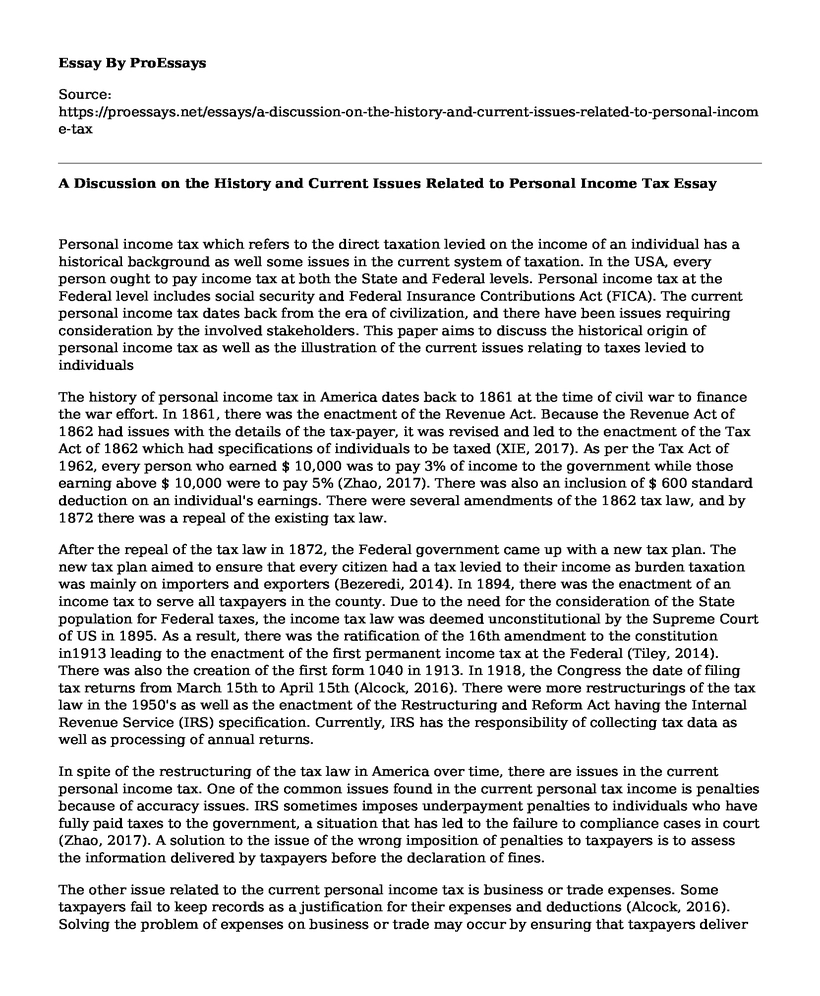Personal income tax which refers to the direct taxation levied on the income of an individual has a historical background as well some issues in the current system of taxation. In the USA, every person ought to pay income tax at both the State and Federal levels. Personal income tax at the Federal level includes social security and Federal Insurance Contributions Act (FICA). The current personal income tax dates back from the era of civilization, and there have been issues requiring consideration by the involved stakeholders. This paper aims to discuss the historical origin of personal income tax as well as the illustration of the current issues relating to taxes levied to individuals
The history of personal income tax in America dates back to 1861 at the time of civil war to finance the war effort. In 1861, there was the enactment of the Revenue Act. Because the Revenue Act of 1862 had issues with the details of the tax-payer, it was revised and led to the enactment of the Tax Act of 1862 which had specifications of individuals to be taxed (XIE, 2017). As per the Tax Act of 1962, every person who earned $ 10,000 was to pay 3% of income to the government while those earning above $ 10,000 were to pay 5% (Zhao, 2017). There was also an inclusion of $ 600 standard deduction on an individual's earnings. There were several amendments of the 1862 tax law, and by 1872 there was a repeal of the existing tax law.
After the repeal of the tax law in 1872, the Federal government came up with a new tax plan. The new tax plan aimed to ensure that every citizen had a tax levied to their income as burden taxation was mainly on importers and exporters (Bezeredi, 2014). In 1894, there was the enactment of an income tax to serve all taxpayers in the county. Due to the need for the consideration of the State population for Federal taxes, the income tax law was deemed unconstitutional by the Supreme Court of US in 1895. As a result, there was the ratification of the 16th amendment to the constitution in1913 leading to the enactment of the first permanent income tax at the Federal (Tiley, 2014). There was also the creation of the first form 1040 in 1913. In 1918, the Congress the date of filing tax returns from March 15th to April 15th (Alcock, 2016). There were more restructurings of the tax law in the 1950's as well as the enactment of the Restructuring and Reform Act having the Internal Revenue Service (IRS) specification. Currently, IRS has the responsibility of collecting tax data as well as processing of annual returns.
In spite of the restructuring of the tax law in America over time, there are issues in the current personal income tax. One of the common issues found in the current personal tax income is penalties because of accuracy issues. IRS sometimes imposes underpayment penalties to individuals who have fully paid taxes to the government, a situation that has led to the failure to compliance cases in court (Zhao, 2017). A solution to the issue of the wrong imposition of penalties to taxpayers is to assess the information delivered by taxpayers before the declaration of fines.
The other issue related to the current personal income tax is business or trade expenses. Some taxpayers fail to keep records as a justification for their expenses and deductions (Alcock, 2016). Solving the problem of expenses on business or trade may occur by ensuring that taxpayers deliver evidence for deductions and expenses to IRS.
Other than the issue of wrong penalties and failure to produce evidence to IRS, the issue of inaccurate information on gross income also affects the current personal income tax. Inaccurate gross income information like canceled debt income and unreported wages has led to conflict between IRS and taxpayers (Bezeredi, 2014). The solution to this issue is to ensure delivery of accurate data on gross income to IRS by the taxpayers.
References
Alcock, J. (2016). Progressive Income Tax and Risky Personal Income: A Real Options Perspective. SSRN Electronic Journal. doi: 10.2139/ssrn.2714899
Bezeredi, S. (2014). Impact of personal income tax changes on citizens' tax burden. Newsletter: An Occasional Publication Of The Institute Of Public Finance. doi: 10.3326/nle.2012.68
Tiley, J. (2014). Studies in the History of Tax Law, Volume 6. London: Bloomsbury Publishing.
XIE, Y. (2017). Analysis on the Related Problems in the Tax Planning of Personal Income Tax. Destech Transactions On Economics, Business And Management, (icem). doi: 10.12783/dtem/icem2017/13113
Zhao, H. (2017). Analysis and Response of Tax Risk Based on the Way of Personal Income Tax. Science Innovation, 5(6), 420. doi: 10.11648/j.si.20170506.26
Cite this page
A Discussion on the History and Current Issues Related to Personal Income Tax. (2022, Oct 06). Retrieved from https://proessays.net/essays/a-discussion-on-the-history-and-current-issues-related-to-personal-income-tax
If you are the original author of this essay and no longer wish to have it published on the ProEssays website, please click below to request its removal:
- Was Reconstruction a Success or Failure?
- Key Steps of Purchasing Activities for Johnson Controls
- Downsides and DCF: Valuing Biased Cash Flow Forecasts
- Liquidity, Profitability and Solvency Analysis Paper Example
- Dealing With Diversity in America From Reconstruction Through the 1920s
- Out of This Furnace: the US Economy in the Period Between 1880 to 1920 Essay
- The Surge of Nationalism: Race, Nationalism, and War Essay Example







